Two-thirds of Americans expect Canada or Mexico to welcome them as refugees
If a crisis in the US forced citizens to run for the borders, 67% of Americans say they expect to be welcomed by Canada or Mexico, according to a new poll by the International Rescue Committee (IRC).


If a crisis in the US forced citizens to run for the borders, 67% of Americans say they expect to be welcomed by Canada or Mexico, according to a new poll by the International Rescue Committee (IRC).
That statistic comes from (Un)welcomed: The State of Refugee resettlement in America, an IRC report released this morning for World Refugee Day. The expectation of asylum comes at an incongruous time, as furor grows over a new US policy to prosecute illegal border crossers—even if they are asylum seekers—and detain their children separately.
In the last two months, at least 2,342 children have been taken from their parents in immigration processing, with children as young as three months old. Since the same period in 2017, the number of asylum-seekers who are granted refuge has also dropped 70%, according to the IRC.
Only 21,000 refugees are expected to be resettled in the US in fiscal year 2018, compared to more than 80,000 in 2016, and 50,000 in 2017, according to IRC data. Meanwhile, the number of refugees in need of shelter worldwide has hit an all-time high: 68 million people, up from 65 million last year.
“The US is abandoning the most in-need refugee populations,” the IRC writes, “including religious minorities; those who assisted U.S. troops and missions overseas; families seeking to be unified with their loved ones; and the 50% of refugees who are children.”
Here’s a look how many people are being resettled in the US from the top five refugee-sending countries, comparing October 1 to April 30 of each year.
In contrast to the current US immigration enforcement policy of “zero tolerance,” American public sentiment reflects a more compassionate ethics: Nearly 60% of US poll respondents said the US “has a moral obligation to help refugees,” the IRC found. And two-thirds of Americans say separating children from their parents at the US border is “unacceptable,” according to both a CBS News survey, and a separate study by Quinnipiac University.
It’s not just talk—more Americans are donating their time and money to the International Rescue Committee, too.
Following the election of US President Donald Trump in 2016, the number of people who wanted to volunteer with the agency, which helps refugees access health care, shelter, and education, and connects refugees to jobs, spiked. In the US, volunteer applications were up by 97% in 2017.